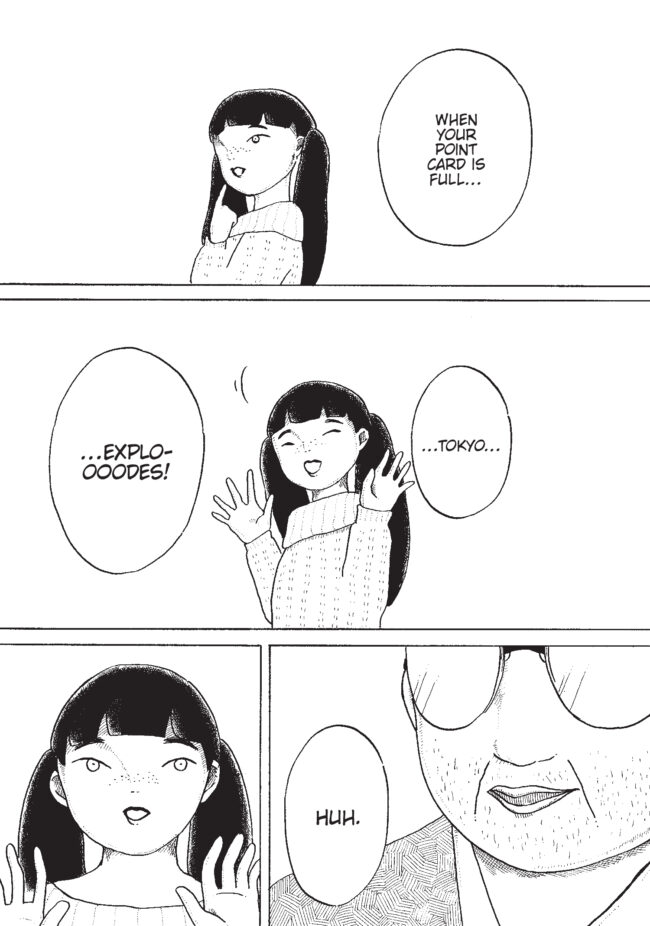Natsuko Ishitsuyo dropped out of Nihon University College of Art after attending for two years, and made the decision, as a fan of the films of Jan Švankmajer, to move to the Czech Republic. She reveals this in a 2014 interview that’s reprinted in the back of Magician A, a debut collection of six of her short stories in English translation. Ishitsuyo applied for a visa, moved to a country where she would get a handle on a notoriously difficult language within a year, applied to study in a program that was only really adjacent to a favorite director, and then completed her studies and returned home to continue working on manga. In the interview, conducted by Jocelyne Allen who also translated the work for this collection, Ishitsuyo acknowledges that there was commercial interest in memoir comics about her studies abroad; she was uninterested.
At first glance, what’s represented in the Magician A stories might seem sweet or sentimental. The most noticeable visual link to the worlds of stop motion she admired are her girls, drawn with doll-like vacant eyes and stiff porcelain fingers. Their environments are familiar enough: classrooms, love hotels, restaurants and the like. But the trick of Magician A is how Ishitsuyo builds a consistent presence and acceptance of magic in the worlds she creates. From story to story her characters encounter magic with either an ambivalence towards its existence or with a lust for opportunism. The reality of magic is never dismissed as a fantasy but instead is presented as one of many consumer choices for self improvement, and is more often than naught unlocked through sexual practice. It’s this commitment to a self-encased, almost blasé surrealism that finds its footing in the films of Švankmajer or Věra Chytilová, but assembles a coda all its own.
In the titular “Magician A” story, a young woman sells the service of her prayers to fix up the humdrum lives of her clients; in “The Flikker” a cottage self-help industry blossoms around a kind of sex magick (more on this later); and in both “Goddess” and “Art School the Mako Way,” a ritualized teaching of masturbation is the first step towards knowledge of self. What’s unique about these stories is the way in which her young protagonists take on sex with little naivety or shame; while it could certainly be argued that some instances find the girls being exploited, the girls walk a line between victim and punchline.
Take for example Maria in “The Flikker,” the number one customer of an old man’s meditation via fingerbanging service that sets up shop in a public park. The most jarring thing in the story is not the service itself but the mutual respect between the man and his clientele: he’s never played for an old pervert, she’s never played for a girl who doesn’t know any better. (I’m thinking here about comics like Usamaru Furuya’s Short Cuts, where schoolgirls might wander unknowingly into and out of a sexual transaction, doing the opposite of this gag.) The old man even offers a kind of punch-card to reward his loyal customers. Maria’s mind is so cleared after a few visits that she starts her own similar business, eventually becoming his competitor.
Competition runs rampant throughout Magician A, and most of the girls that encounter magic do so because they’re compelled to make themselves stand out as the best possible candidates for success. When intimacy is no longer transactional, the wheels start to come off for these characters. The best and most sympathetic example is in the story “Kebab,” where a girl who sells sexual favors (who also uses a customer loyalty punch-card) makes the mistake of negating her fee.
Magician A presents a consistently unsettling dark humor. The last story, titled “????” in the table contents but that ends with the title “Hexican A,” follows a young girl named Ayumi starting her education in a magician school, much to the displeasure of her peers. She picks up the ability to perform hexes -- which have their own niche market as much as prayers did in “Magician A.” The only bump in the road is her roommate, a messy old woman who is perpetually in the throes of passion with her Hitachi wand. But she and Ayumi form what is maybe the most genuine affection for each other out of all of the stories -- one that exists in the realm of magic without transaction. These are very accomplished visions from a determinedly independent creator, and we’re so lucky to have them.










